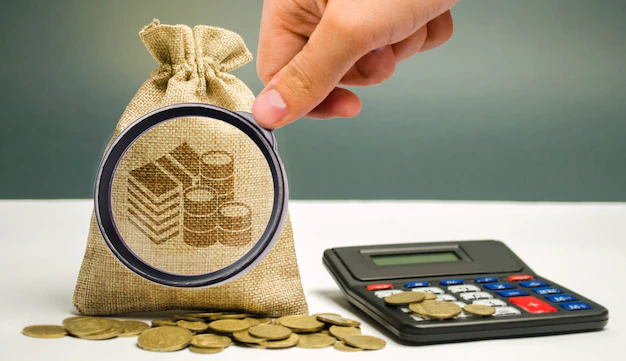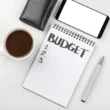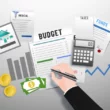A budget can be a powerful tool to help you take control of your money. But where do you start? What are the basic elements of a budget?
A budget is a plan for how you will use your money. It helps you track your income and expenses, prioritize your spending, and save for your goals. There are five basic elements of a budget: income, fixed expenses, savings, debt, and variable unplanned expenses. Understanding each of these elements and how they work together can help you create a budget that works for you.
Income is the money you earn from your job, investments, or other sources. Expenses are the things you spend money on, such as rent, groceries, and entertainment. Savings is the money you set aside for emergencies or future goals, such as a down payment on a house or a vacation. Debt is any money you owe, such as credit card debt or a car loan. Investments are the money you put into stocks, bonds, or other assets to grow your wealth over time.
It is imperative that you understand these five basic elements of a budget, so you can create a plan that allows you to live within your means, save for your goals, and build a strong financial future.
The Importance of Budgeting
Budgeting is an essential aspect of personal finance that can help you manage your money effectively. By creating a budget, you can gain control over your finances and work towards achieving your financial goals. In this section, we will discuss the definition of budgeting and why it is crucial.
Definition of Budgeting
Budgeting is the process of creating a plan that outlines your income and expenses for a specific period. It involves tracking your spending, identifying areas where you can cut back, and allocating money towards your financial goals. A budget can be created on a monthly, quarterly, or yearly basis, depending on your needs.
Why Budgeting is Important
There are several reasons why budgeting is important. Here are some of the key benefits of creating a budget:
- Helps you manage your finances: By creating a budget, you can keep track of your income and expenses and ensure that you are not overspending. This can help you avoid debt and save money for the future.
- Enables you to achieve your financial goals: A budget can help you prioritize your spending and allocate money towards your financial goals, such as paying off debt, building an emergency fund, or saving for retirement.
- Provides a sense of control: By creating a budget, you can take control of your finances and make informed decisions about your spending. This can give you a sense of empowerment and reduce financial stress.
- Helps you plan for the future: By tracking your spending and income, you can identify trends and plan for future expenses. This can help you avoid financial surprises and ensure that you are prepared for unexpected events.
- Allows you to make informed financial decisions: By having a clear understanding of your finances, you can make informed decisions about investments, credit cards, loans, and other financial products.
In summary, budgeting is an essential aspect of personal finance that can help you manage your money effectively, achieve your financial goals, and reduce financial stress. By creating a budget, you can gain control over your finances and make informed decisions about your spending.
The Five Basic Elements of a Budget
Creating a budget is essential to achieving your financial goals. A budget is a plan that helps you manage your money by tracking your income and expenses. It comprises five basic elements: income, expenses, savings, debt, and investments/budgeting tools. Let’s take a closer look at each element.
1. Income
Income is the money you earn from your job, investments, or any other sources. It is the first element of a budget that you need to consider. To create an accurate budget, you need to calculate your net income, which is your take-home pay after taxes and other deductions. You can use this amount to determine how much you can afford to spend on expenses and how much you can save.
2. Expenses
Expenses are the costs you incur in your daily life. They can be categorized into fixed, variable, planned, and unplanned expenses. Fixed expenses are those that you have to pay every month, such as rent, utilities, and insurance.
Planned expenses are those that you know you will have to pay, such as car repairs or medical bills.
3. Variable or Unplanned Expenses
Unplanned expenses are those that arise unexpectedly, such as emergency repairs or medical expenses. Variable expenses are those that change from month to month, such as groceries, entertainment, and clothing.
4. Savings
Savings are an essential part of any budget. They help you build an emergency fund, save for retirement, or achieve any other financial goals you may have.
You should aim to save at least 20% of your income each month. You can set up automatic transfers to your savings account to make saving easier.
5. Debt
Debt is the money you owe to others. It can be in the form of credit card debt, loans, or any other type of debt. Managing debt is crucial to achieving financial stability. You should aim to pay off high-interest debt first and avoid taking on new debt unless it is necessary.
Now we will discuss the five elements of a budget in detail:
Income
When it comes to budgeting, the first and most important element to consider is your income. Income refers to the money you earn from any source, such as employment, investments, or other sources like alimony and child support payments.
To create a budget, you need to start by determining your total monthly income. This includes both your regular and irregular income. Regular income is the money you earn consistently, such as your salary or wages. Irregular income is the money you earn sporadically, such as bonuses or freelance work.
Once you have calculated your total income, you can determine your net and gross income. Net income is the amount of money you have after taxes and other deductions have been taken out. Gross income is the total amount of money you earn before taxes and other deductions have been taken out.
It’s important to accurately calculate your income to ensure that you clearly understand how much money you have available to allocate towards your expenses, savings, debt, and investments. This will help you make informed decisions about your finances and create a realistic budget that you can stick to.
To help you keep track of your income, you can use a table or spreadsheet to record your monthly income. This will allow you to easily calculate your net and gross income and track any irregular income you receive.
In summary, income is a budget’s first and most important element. It’s crucial to accurately calculate your income, including your net and gross income, to create a realistic budget that you can stick to. Use a table or spreadsheet to track your income and make informed decisions about your finances.
Expenses
When creating a budget, it’s important to consider all of your expenses. Expenses can be broken down into three categories: fixed, variable, and flexible.
Fixed Expenses
Fixed expenses are expenses that remain the same each month, such as rent or mortgage payments, car payments, and utilities. These expenses are typically the easiest to budget for since they don’t change from month to month.
Variable Expenses
Variable expenses are expenses that can fluctuate from month to month, such as entertainment, groceries, and planned expenses like vacations or gifts. These expenses can be more difficult to budget for since they can change from month to month.
Flexible Expenses
Flexible expenses are expenses that you have some control over, such as discretionary spending or unplanned expenses like clothing, medication, or fuel. These expenses can be the most challenging to budget for since they can vary greatly from month to month.
When creating your budget, it’s important to consider all of your expenses and determine which category they fall under. This will help you to create a more accurate budget and ensure that you are able to cover all of your expenses each month. Consider using tables or bullet points to help you organize your expenses and make it easier to track your spending.
Savings
When creating a budget, savings is an essential element that should not be overlooked. Saving money allows you to have funds available for emergencies, future expenses, and investing. Here are some tips to help you save effectively:
Set a Savings Goal
The first step in saving effectively is to set a savings goal. Determine how much money you want to save and by when. This will help you stay motivated and focused on your savings plan.
Create an Emergency Fund
An emergency fund is a separate savings account that you can use to cover unexpected expenses, such as car repairs or medical bills. Aim to save at least three to six months’ worth of living expenses in your emergency fund.
Track Your Expenses
To save effectively, you need to know where your money is going. Keep track of your expenses by using a budgeting app or spreadsheet. This will help you identify areas where you can cut back and save more money.
Automate Your Savings
One of the easiest ways to save money is to set up automatic transfers from your checking account to your savings account. This way, you won’t have to think about saving – it will happen automatically.
Invest Your Savings
Once you have built up your emergency fund, consider investing your savings to earn a higher return. Consult with a financial advisor to determine the best investment options for your financial goals.
In summary, savings is a crucial element of a budget. Set a savings goal, create an emergency fund, track your expenses, automate your savings, and consider investing your savings to maximize your financial potential.
Debt
When creating a budget, it is important to consider all your debts. Debt is any amount of money borrowed by one party from another. It is used by many people to make large purchases they could not otherwise afford under normal circumstances. Debt can be broken down into different types, including secured and unsecured debt.
Credit Card Debt
Credit card debt is a type of unsecured debt that is incurred when you use your credit card to make purchases. This type of debt can be particularly challenging to manage because of high-interest rates. If you carry a balance on your credit card, it is important to pay it off as soon as possible to avoid incurring additional interest charges. You can use a debt payoff calculator to determine how long it will take you to pay off your credit card debt.
Loans
Loans are a type of debt that can be either secured or unsecured. Secured loans are backed by collateral, such as a car or a house. Unsecured loans, on the other hand, are not backed by collateral. Personal loans, student loans, and auto loans are all examples of unsecured loans. When creating a budget, it is important to consider all of your loan payments and factor them into your monthly expenses.
It is important to note that not all debt is bad. In fact, some types of debt can be beneficial, such as a mortgage. However, it is important to manage your debt responsibly and make sure that you are not taking on more debt than you can afford to pay back. By creating a budget and tracking your expenses, you can better manage your debt and work towards financial stability.
| Type of Debt | Definition |
|---|---|
| Secured Debt | Debt backed by collateral, such as a car or a house |
| Unsecured Debt | Debt not backed by collateral |
| Credit Card Debt | Unsecured debt incurred when using a credit card |
| Loans | A type of debt that can be either secured or unsecured |
In summary, debt is an important consideration when creating a budget. By understanding the different types of debt, such as credit card debt and loans, you can better manage your finances and work towards financial stability.
What Are Some Budgeting Tools?
When it comes to creating and managing a budget, there are many budgeting tools available to help you. These tools can be especially helpful if you’re new to budgeting or need some extra guidance. Here are a few budgeting tools you may want to consider:
1. Budgeting Apps
Budgeting apps are a popular choice for those who want to keep track of their finances on the go. These apps can help you track your spending, set financial goals, and create a budget.
2. Spreadsheets
Spreadsheets are a classic budgeting tool that many people still use today. They can be especially helpful if you want to create a customized budget that fits your specific needs. You can create your own spreadsheet or use a pre-made template.
3. Envelope System
The envelope system is a budgeting method where you allocate cash into different envelopes for different expenses. This can be a helpful tool if you tend to overspend in certain categories. It can also help you visualize how much money you have left for each expense.
4. Financial Planning Software
Financial planning software can be helpful if you want to create a more comprehensive financial plan. These tools can help you track your investments, plan for retirement, and create a long-term financial strategy. Some popular financial planning software options include Personal Capital and Wealthfront.
5. Financial Planners
If you need more personalized guidance, you may want to consider working with a financial planner. A financial planner can help you create a budget, set financial goals, and create a long-term financial plan. They can also provide advice on investments and retirement planning. Keep in mind that working with a financial planner may come with additional fees.
Overall, there are many budgeting tools available to help you create and manage a budget. Whether you prefer to use an app, spreadsheet, or work with a financial planner, finding the right tool can help you stay on track and reach your financial goals.
YOU SHOULD ALSO READ:











